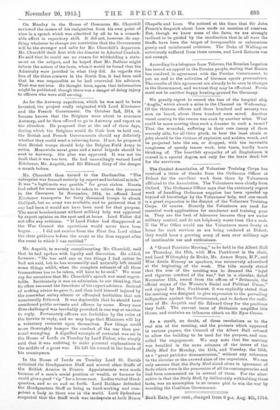Mr. Asquith, in warmly complimenting Mr. Churchill, said that he
had spoken with loyalty and discretion. He added, however: "He has said one or two things I had rather be bad not said, but he has necessarily and naturally left unsaid some things which, when the complete estimate of all the transactions has to be taken, will have to be said." We must say for ourselves that Mr. Churchill's speech was most regret- table. Inoidentailly it was an admission, to our thinking, that be often assumed the functions of his expert advisers. Instead Of seeking advice he gave it, and then held himself injured by the somewhat sultry silence or affronted hesitation that not unnaturally followed. It was deplorable that he should have mentioned public servants and officers by name. Every man thus challenged was inevitably provoked in one way or another to reply. Fortunately officers are forbidden by the rules of the Service to reply, and we may hops that Ministers will lay a voluntary restraint upon themselves. Few things could more thoroughly hamper the conduct of the war than per- sonal wrangling. A dignified example of restraint was set in the House of Lords ou Tuesday by Lord Fisher, who simply said that it was unfitting to make personal explanations in the middle of a great war. He left his record in the bands of his countrymen.














































 Previous page
Previous page